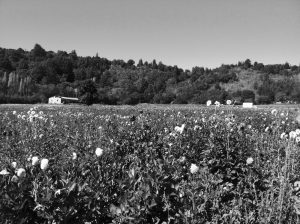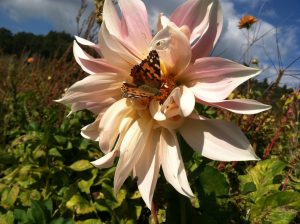By Colorado Review Editorial Assistant Jennifer Anderson
 If I have often been drawn to place-based writing as a way to travel from one locale to another through the nuances of language, then this winter I have been drawn to writing that evokes the liminal imaginary of being caught or pulled between places, between ways of understanding. This winter has often been that in-between, longing for a place closely known while feeling it shift ever further away. Reading many of the poems in the Spring 2019 issue of the Colorado Review resonated with me in that they evoke this sense of existing through something absent or distant, and having the negotiation alter where and how they are pronouncedly.
If I have often been drawn to place-based writing as a way to travel from one locale to another through the nuances of language, then this winter I have been drawn to writing that evokes the liminal imaginary of being caught or pulled between places, between ways of understanding. This winter has often been that in-between, longing for a place closely known while feeling it shift ever further away. Reading many of the poems in the Spring 2019 issue of the Colorado Review resonated with me in that they evoke this sense of existing through something absent or distant, and having the negotiation alter where and how they are pronouncedly.
Katherine Fallon’s “Letters from the Farm” (see her other poem from the issue, “Leaving Red Rocks,” online here) is especially expressive of the sensory threshold of change, of the weight of someone’s absence, and what it means to not quite be able to turn away from what their presence meant for a time. She writes:
In the field where bone became stone long before I knew you,
a flock of sparrows sits quiet as quartz between plumed grasses.
My footsteps disturb them into a swarm (mine only;
yours withdrawn). Startled by small birds I’ve startled,
I stand still and let my loss set in: the heart slows,
the hands unfurl to cup the air, in petition.
These lines are evocative of what is present, what is missing, what is still, what is as lasting as stone, what is in flight. They remind me of moving through the ebbed-away branches of trees in February, the silent, still space in which there is room to “petition” for and be cognizant of what has passed, what is no longer, what is elsewhere. As much as the narrator is in the field with the sparrows, she is also with what is absent, and her “hands unfurl to cup” the loss. Walking around campus, through the foothills, along the sidewalks along streets, I had a sense this winter of “my footsteps” and those “withdrawn,” a sense of what was not accompanying me as much as what was. In the last section she writes:
What of the mustard tucked into a bed of cauliflower,
or the magpie’s dive-bomb wingspan, fanned across
the rimrock? My boot leaks, sticks fast into the over-
watered field, and I know I was mistaken: none
of my new learning is intended for you. I approach
the land I keep alone and like a storm, hand raised
above the brow to see, far-off, what’s coming.
Like Fallon’s boot, I was sucked into the over-watered field when she writes of the mustard and cauliflower. Fields of brussels sprouts and mustard on coastal farms are part of the absence I felt in classes, in walking between them. This winter’s pulling in-between was the memory asking for certain places as frequently as breathing. It drifted to open spaces; to thick, red dirt; to a certain type of seeing. Pursuing my master’s degree is often a longing for the openness of rimrock and wingspan. It is often being pulled between ways of  understanding the world.
understanding the world.
Fallon writes the juxtapositions in which a sense of loss casts her life. She writes, “Longer now since you loved me / than you loved me, the difference stretches narrowly on, deepens.” She writes, “Expectation’s tight cup, loose dirt: a home.” The rifts she renders through longing and grief expand and deepen, then eventually seem the place she looks forward from. When she writes, “and I know I was mistaken: none // of my new learning is intended for you,” I realize winter’s liminal imaginary, existing in a pull between memory and a present, has been a new form of learning to move into what is coming for me, too. So much negotiation has me looking forward this spring, knowing the places of absence I feel are not what this new learning is intended for.